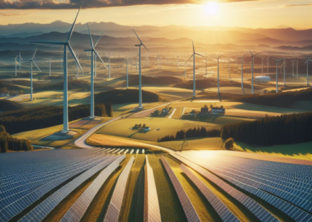Geothermal energy: green district heating

Germany has set itself the goal of achieving climate neutrality in the heating sector by 2045. A large proportion of energy is used for heating, almost 70 percent of which is fossil fuels. Natural gas in particular. Since the war in Ukraine, Germany wants to get by without Russian natural gas as quickly as possible. Deep geothermal energy could make a contribution to district heating, especially in cities and densely populated areas with existing heating networks. Three regions in particular are suitable for the use of deep geothermal energy:
- the Molasse Basin in southern Germany,
- the North German Basin and
- the Upper Rhine Graben.
For a long time, it was thought that geothermal energy was not worthwhile due to high initial investments. Last summer, Brussels gave the green light to the German government’s funding program for the climate neutrality of district heating systems and the construction of new climate-neutral grids. There are 42 geothermal power plants in Germany.
In November 2022, the German government announced that it wants to connect 100 more power plants to the grid by 2030. New projects such as GeoHardt are in the starting blocks. The two energy suppliers EnBW and MVV want to use hot deep water from the Upper Rhine Graben for a CO2-free heat supply and thus replace part of the heat generated by the large-scale hard coal-fired power plant in Mannheim. The heating networks are widely available in the region.
Geothermal energy is not dependent on weather conditions or the time of day and can supply environmentally friendly heat almost continuously throughout the year. The efficiency is high and the impact on flora and fauna is low. There is also no need for storage and electricity-heat combination concepts are conceivable to make the provision of heat more flexible in summer. Nevertheless, there are fears and public protests, as the deep boreholes could cause vibrations and thus damage buildings.
Experts believe that the risk of earthquakes is manageable when operating modern hydrothermal power plants. However, nothing can be ruled out. There is always a residual risk, which may be higher with other forms of energy generation. Geothermal energy is needed in the fight against climate change and for security of supply.

Doris Höflich, Market Intelligence Senior Expert
Source:
- GeoHardt, energate, 05.01.2023







